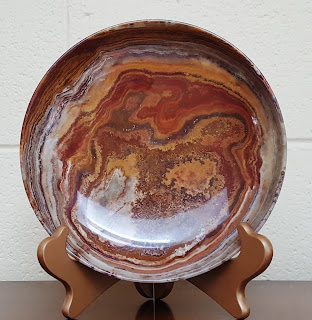 |
| Green striped Onyx lapidary slab |
Darn.
It's still a lovely material, but it's one of those situations where it's a lot catchier to call a mineral Onyx, than Banded Calcite.
The banded calcite, CaCO3, is a carbon-based mineral that is commonly found in Mexico and India. From a lapidary standpoint, it's pretty soft at around 3 on the Mohs Scale.
POPULAR DECORATIVE MATERIAL
 |
| Onyx bowl in browns |
Like me, you may have a bowl, carving, or chess set made with this soft stone. The softness of this material also means when you start working it on your grinding wheels, it is best to start with your second wheel in so you don't take off too much material too quickly.
 |
| Mindat.org Onyx image |
TRUE ONXY is actually a variety of Agate, and as such, hits the Mohs scale between 6.5 and 7, making it more than twice as hard as banded calcite. According to Mindat.org, Onyx is a black and white banded agate or at times a monochromatic agate with light and dark bands. It does come in brown and red varieties; they are called Sardonyx. Mindat states, "Agate and onyx are both varieties of layered chalcedony that differ only in the form of the bands: agate has curved bands and onyx has parallel bands." The stones with parallel bands have been used to make cameos.
Now, bear with me. In the Mindat.org image, I would have just called this banded agate even though the brown layers are somewhat translucent. They are parallel, but also curved. Of course, translucence is not a requirement of Onyx. In fact, it seems to rule the material out.
 |
| Wikipedia Onyx image |
Now, the more I get into this, the stranger it seems. Here's another image from Wikipedia they claim is onyx.
 |
| Limestone Onxy |
Checking around the internet, I found claims of green onyx (can be one of several items), onyx opal, rhodochrosite onyx and more. It seems as if any mineral that is translucent is being labeled onyx.
GETTING REAL
Under the theory that "IT IS WHATEVER I SAY IT IS" I hereby declare that in America, Onyx is a translucent calcite. It is very soft. It has layers, most often parallel, and comes in a wide range of mostly pastel colors. The GIA might disagree with my declaration, but since they don't include Onyx as a gemstone in their online Gem Encyclopedia, well, my decision stands.
WORKING THE SLAB
 The slab at the top is the one that inspired me to do a blog on Onyx. So, of course, I had to work on some of it.
The slab at the top is the one that inspired me to do a blog on Onyx. So, of course, I had to work on some of it. I know the picture makes it look somewhat cylindrical, but it's not. I cut across the light bands and domed it, making the straight lines look like they are curved. From one side to the other, the back is flat. I played around with the top so that it is flattened in a way that mimics the curve in the rock making the picture a bit of an optical illusion. Then I put a bevel all around the back edge to keep the material from chipping.
I'd love to hear what you think on this topic.
Until next time,
Your Lapidary Whisperer,
Donna

